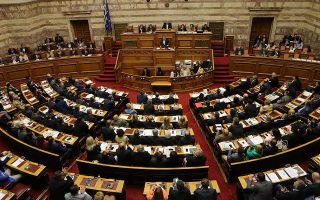European Parliament elections a domestic earthquake

The political scene changed utterly Sunday, as New Democracy swept to a convincing victory over the ruling SYRIZA party in European Parliament elections. Prime Minister Alexis Tsipras had framed the poll as a vote of confidence in his government, his policies and himself. The vote, however, turned out to be not only a defeat for Tsipras but also an earthquake in Greece’s politics. With center-right New Democracy winning by a wide margin, with SYRIZA dropping despite having invested heavily in polarizing rhetoric and in handouts to voters, and with PASOK taking third place ahead of the Communist Party and neo-Nazi Golden Dawn, it appears that the division between pro-bailout and anti-bailout forces has run its course. The early parliamentary elections that Tsipras will call for in a week’s time will probably reflect this.
Alexis Tsipras and SYRIZA swept to power in January 2015 with 36.34 percent of the vote, riding a wave of public anger at austerity and reform that creditors and European Union partners imposed on the Greeks in the 2010 bailout agreement. Governing with the extreme right-wing Independent Greeks, SYRIZA presented itself as the voice of the common people against the elites. Although he failed to force creditors to bend to his will, and in mid-2015 he was forced to accept a new bailout with onerous conditions, Tsipras kept up his attacks on rivals at home. In recent weeks, as the European Parliament elections approached, he invested heavily in a campaign that was politically divisive and which also threatened to derail the sacrifices of years of austerity. He warned pensioners that the handouts his government had provided in recent week depended on their vote Sunday. The tactic did not work. The reasons that people abandoned SYRIZA will be clearer in the next few days, but it appeared that many of the centrist voters who had pushed from the fringes of politics to center stage were no longer satisfied with Tsipras’ polarizing language, his policies and, perhaps, his government’s tolerance of anti-establishment activism.
In his post-election statement shortly before midnight last night, Tsipras said that he would visit President Prokopis Pavlopoulos immediately after the second round of local elections, which will be held on Sunday, and ask him to call parliamentary elections. The prime minister chose to present the political choice as one between light and darkness, with his party promising release from austerity while its rivals were ostensibly in favor of austerity, the elites and the International Monetary Fund. This was a seamless continuation of the election campaign that had brought defeat in Sunday’s elections for the European Parliament and local authorities. This suggests that SYRIZA may not only maintain polarizing language but may also increase the tension in an effort to keep votes.
New Democracy leader Kyriakos Mitsotakis, on the other hand, had appeared conciliatory in his statement earlier Sunday. He called on the prime minister to call elections as soon as possible but also called on ND supporters to act “with responsibility and, above all, with modesty.” It will be a tough task to achieve this, if the government and its supporters maintain the tension of the past weeks. But Mitsotakis is in a position to put his stamp on his party now. He is credited with its remarkable revival, leading it to victory for the first time since June 2012, when it gained 29.66 percent. This means that Mitsotakis may be able to push the reform agenda that he proposed when he was elected party leader in a vote by party supporters in January 2016. Mitsotakis, although the son of a former prime minister, had been considered an outsider because of his reformist bent in a party with strong statist transition. Tsipras has continually focused his attacks on Mitsotakis, providing his rival with a new level of credibility now that Mitsotakis is credited with Sunday’s victory.
The next few weeks and months will be crucial to domestic politics and to Greece’s relations with its partners in the European Union, its allies and its creditors. Tsipras and Mitsotakis bear a heavy burden of responsibility as they lead the nation to elections. If division reigns, many of the sacrifices of the past 10 years will have been in vain and Greece will be in a worse position than it was before the crisis.





